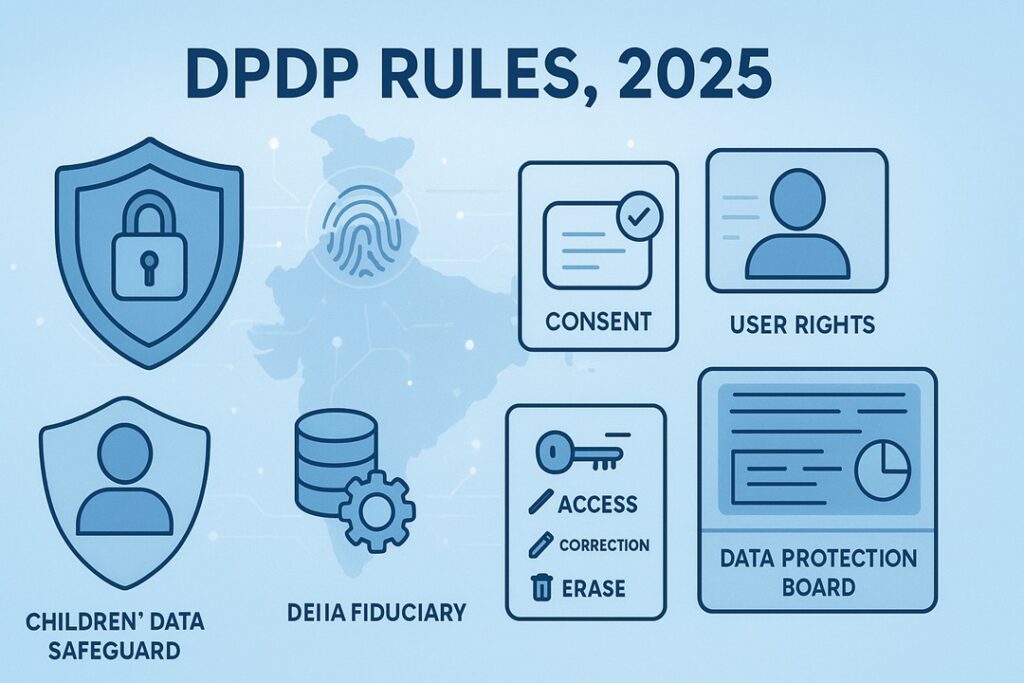DPDP Rules, 2025: A New Era of Citizen-Centric Data Protection in India

Context:
The Government of India has officially notified the Digital Personal Data Protection (DPDP) Rules, 2025, bringing into full effect the provisions of the DPDP Act, 2023.
What it is
A comprehensive set of regulatory guidelines issued to implement the Digital Personal Data Protection Act, 2023. These rules define operational procedures for personal data handling, consent requirements, safeguards, compliance timelines, and oversight mechanisms.
Enforcement is carried out through the Data Protection Board of India, a fully digital adjudicatory authority.
Aim
- To safeguard digital personal data while promoting innovation, ease of compliance and economic growth.
- To clearly outline the obligations of Data Fiduciaries and the rights of Data Principals with a focus on transparency and accountability.
- To ensure secure, consent-driven, purpose-specific and responsible processing of personal data.
Key Features of DPDP Rules, 2025
Phased Implementation (18 months)
A gradual rollout over 18 months to help organisations—particularly startups and MSMEs—transition smoothly into compliance.
Clear and Simple Consent Notices
Data Fiduciaries must issue standalone, plain-language consent notices that clearly state the purpose of data collection and usage, ensuring informed decision-making.
Data Breach Notification Protocol
Organisations must promptly inform affected individuals of any data breach, including details of the breach, associated risks, corrective measures taken and relevant contact information.
Special Safeguards for Children and Persons with Disabilities
- Verifiable parental consent is mandatory for processing children’s data.
- For persons with severe disabilities, consent must come from a lawful guardian.
- Exemptions apply only for essential services such as education, healthcare and safety.
Transparency and Accountability Measures
- Data Fiduciaries must clearly display contact details of a designated officer or Data Protection Officer (DPO).
- Significant Data Fiduciaries are required to undertake:
- Independent audits
- Data Protection Impact Assessments
- Technology due-diligence
- Enhanced compliance processes
Strengthened Rights of Data Principals
Individuals have the right to:
- Access, correct, update or erase their personal data
- Withdraw consent
- Nominate another person to exercise their rights
Organisations must respond to such requests within 90 days.
Consent Managers
Consent Managers must be Indian entities. They enable individuals to centrally manage, track and revoke permissions across multiple platforms through a unified interface.
Digital-First Data Protection Board
A fully online system for grievance redressal, offering app-based complaint filing and tracking. Appeals from DPB decisions will be heard by TDSAT.
Technology-Neutral and SARAL Design
The rules follow the SARAL principle—Simple, Accessible, Rational, Actionable and Lasting—ensuring clarity, ease of implementation and adaptability to evolving technologies.
Conclusion
The DPDP Rules, 2025 mark a significant step in India’s data governance framework by balancing citizen-centric privacy safeguards with digital innovation. By strengthening accountability, ensuring informed consent, and adopting a technology-neutral, phased approach, the framework aims to build a secure and transparent data ecosystem. This positions India to address emerging digital challenges while enabling sustained economic and technological growth.
Source : PIB
